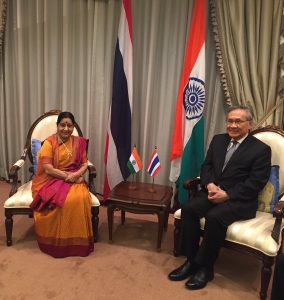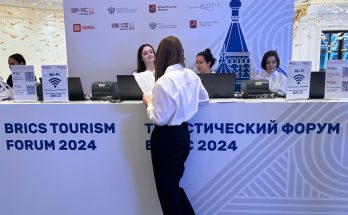 It’s the Act East season in India. Ahead of the India-ASEAN summit in Delhi which will mark the silver jubilee of this burgeoning partnership, India’s External Affairs Minister Sushma Swaraj has embarked on a three-nation tour of Southeast Asian countries, including Thailand, Indonesia and Singapore.
It’s the Act East season in India. Ahead of the India-ASEAN summit in Delhi which will mark the silver jubilee of this burgeoning partnership, India’s External Affairs Minister Sushma Swaraj has embarked on a three-nation tour of Southeast Asian countries, including Thailand, Indonesia and Singapore.The minister’s ASEAN trip will focus on deepening political, defence and economic ties with these countries that are dynamic economies and have a significant Indian-origin population.
Swaraj reached Bangkok, the first stop of her tour, on January 4 where she held wide-ranging talks with her Thai counterpart Don Pramudwinai. Issues relating to connectivity, security and cultural cooperation figured prominently in the talks. Thailand will be the coordinator country for India-ASEAN relations in 2018.
Indonesia will be her next stop, where she will co-chair the 5th meeting of India-Indonesia Joint Commission with her Indonesian counterpart, Ms. Retno Marsudi. They will also jointly inaugurate the second meeting of ASEAN-India Network of Think Tanks. Recently, the ‘India Culture Week’ concluded at the central public square in Bandung on December 31 with a grand Indian music and dance performance that was attended by more than 3,000 local citizens and art lovers in Bandung.
The highlight of her Singapore visit will be the Regional Pravasi Bharatiya Divas (PBD) of ASEAN countries. Themed “Ancient Route, New Journey: Diaspora in the Dynamic ASEAN-India Partnership”, the two-day conference will see top leaders and businessmen discuss issues like start-ups, cyber security and disruptive technologies in manufacturing. Writers’ and film festival, art and photo exhibition, along with Ayurveda and yoga workshops, will also be major attractions.
In a unique gesture, India has invited the leaders of all 10 ASEAN countries to participate in the Republic Day celebrations, which underscores the growing salience of the region in India’s foreign policy calculus.
Connectivity, business, anti-terrorism and maritime security have been key themes dominating India-ASEAN dialogues in recent times. The centrality of ASEAN in New Delhi’s Act East policy was the focus in Prime Minister Narendra Modi’s address at the ASEAN-India and East Asia Summits held in November in Manila and was also demonstrated at the ASEAN India Connectivity Summit (AICS) that India hosted in December. Amid China’s growing assertions in the region, ASEAN countries are increasingly looking at India to play a bigger role in shaping an inclusive regional architecture.
Author Profile
- India Writes Network (www.indiawrites.org) is an emerging think tank and a media-publishing company focused on international affairs & the India Story. Centre for Global India Insights is the research arm of India Writes Network. To subscribe to India and the World, write to editor@indiawrites.org. A venture of TGII Media Private Limited, a leading media, publishing and consultancy company, IWN has carved a niche for balanced and exhaustive reporting and analysis of international affairs. Eminent personalities, politicians, diplomats, authors, strategy gurus and news-makers have contributed to India Writes Network, as also “India and the World,” a magazine focused on global affairs.
Latest entries
 In ConversationJuly 26, 2024India-Italy defence collaboration can extend to third countries: Anil Wadhwa
In ConversationJuly 26, 2024India-Italy defence collaboration can extend to third countries: Anil Wadhwa In ConversationJuly 23, 2024Italy views India as a key partner in Indo-Pacific: Vani Rao
In ConversationJuly 23, 2024Italy views India as a key partner in Indo-Pacific: Vani Rao DiplomacyJune 29, 2024First BRICS unveils a roadmap for boosting tourism among emerging economies
DiplomacyJune 29, 2024First BRICS unveils a roadmap for boosting tourism among emerging economies India and the WorldJune 11, 2024On Day 1, Jaishankar focuses on resolving standoff with China
India and the WorldJune 11, 2024On Day 1, Jaishankar focuses on resolving standoff with China






